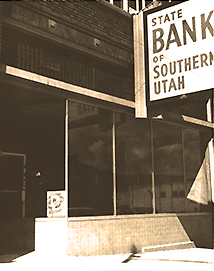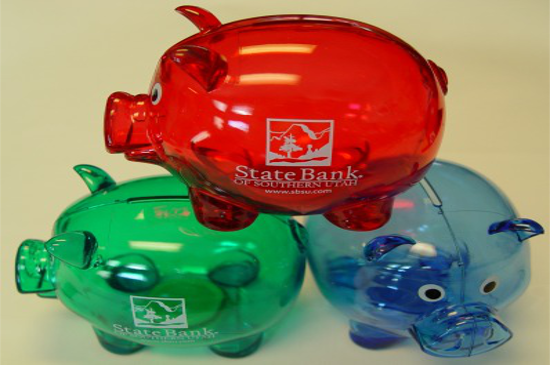Stop keeping up with the Joneses – They’re Broke
Finance and Kids
In many instances when a child turns 18 and leaves home to go to college they realize that they don’t know much about finances. They don’t learn about finances in school so it mostly falls to the parents to teach them the importance of managing their money. Luckily, parents can start early when the child is young. How early can you start teaching your child? There really is no specific age however, the opportunity to teach about money (more…)
Prevent a Holiday Spending Hangover
State Bank is kicking off the 2012 holiday shopping season with tips to avoid a post-holiday credit hangover.
A National Retail Federation survey released earlier this month showed consumers will spend an average of $749.51 on gifts and holiday goodies. We spent $740.57 per person last year, the group said.
Here’s how that spending breaks down:
— $421.82 on children, parents and relatives
— $75.13 on friends
— $23.48 on co-workers
— $28.13 on others, including pets
— $100.76 on food and candy
— $28.66 greeting cards
— $19.55 on flowers
— $51.99 on decorations
All in all, the federation is predicting a $586.1 billion haul from the holidays.
Keep in mind that January bills are only a couple of months away. If you’re not budgeting for your holiday purchases, you’ll find yourself bringing in the New Year with last year’s debt.
- Create a budget and stick to it. Set a dollar amount based on what you can afford this holiday season. Be sure to include a cushion for unexpected expenses.
- Make a list. Write down the names of the people you plan to buy gifts for and how much you can afford to spend. Don’t forget expenses like wrapping paper, cards and postage.
- Bake some cookies. If you can’t afford to buy gifts for everyone on your list, bake some holiday goodies and wrap them with a bow. Handmade gifts are a special way to say ‘Happy Holidays’ without overspending. Be sure to include these costs in your budget.
- Use credit wisely. Your credit card balance shouldn’t be a complete surprise when you open your statement in January. Avoid going into debt for gifts.
- Save your receipts. Keep track of your expenses and add them up weekly to be sure you’re sticking to your budget. If you’re getting close to your spending limit, reevaluate your list and bake more cookies!
- Shop around. Start your holiday shopping early to give yourself time to comparison shop. Take time to do some research before you hit the stores by going online or looking at your local newspaper circulars.
FDIC Overview
HSA Accounts and Debit Cards
What is an HSA?
A health savings account (HSA) is a tax-favored savings account created for the purpose of paying medical expenses.
- Tax-deductibleContributions to the HSA are 100% deductible (up to the legal limit) — just like an IRA.
- Tax-freeWithdrawals to pay qualified medical expenses are never taxed.
- Tax-deferredInterest earnings accumulate tax-deferred, and if used to pay qualified medical expenses, are tax-free.
- HSA money is yours to keepUnlike a flexible spending account (FSA), unused money in your HSA isn’t forfeited at the end of the year; it continues to grow, tax-deferred
How does an HSA Plan Work?
An HSA works in conjunction with high deductible health insurance.Your HSA dollars can be used to help pay the health insurance deductible and any qualified medical expenses, including those not covered by the health insurance, like dental and vision care.
Any funds you withdraw for non-qualified medical expenses will be taxed at your income tax rate, plus 10% tax penalty.
Once you meet your calendar-year deductible, the health insurance pays remaining covered expenses in accordance with the terms and conditions of your particular plan. Some plans pay 100% of covered expenses after the calendar-year deductible is met.
How do I get an HSA Debit Card?
An HSA Debit card allows you the convenience of spending money from your HSA account through the use of a card. An HSA debit card can only be used at a healthcare facility or merchant. Withdrawal restrictions are also waived on HSA debit cards.
Visit any State Bank branch to fill out an application for an HSA debit card. Please visit www.sbsu.com for more information regarding the State Bank HSA Account.
About Us

Hometown banking was established in southern Utah with the opening of State Bank of Southern Utah in 1957.
Hometown banking is important because people who live and work in southern Utah make the decisions. Bank employees and officers understand the banking needs of area residents because they are affected by the same economic climate. Find out what hundreds already know - hometown banking is better.
Archives
- June 2015
- May 2015
- January 2015
- December 2014
- October 2014
- September 2014
- July 2014
- June 2014
- May 2014
- April 2014
- March 2014
- February 2014
- January 2014
- November 2013
- October 2013
- August 2013
- July 2013
- June 2013
- March 2013
- February 2013
- January 2013
- December 2012
- November 2012
- October 2012
- September 2012
- August 2012
- July 2012








Courtesy of Mint.com
It used to be that spending money on status symbols for the sake of flaunting your wealth was an activity reserved for celebrities and millionaires.
That has all changed. Conspicuous consumption, what was once referred to as “keeping up with the Joneses”, has brought the lifestyles of the rich and famous to suburbia.
Just as most people consider themselves to be above-average drivers, most people assume (more…)